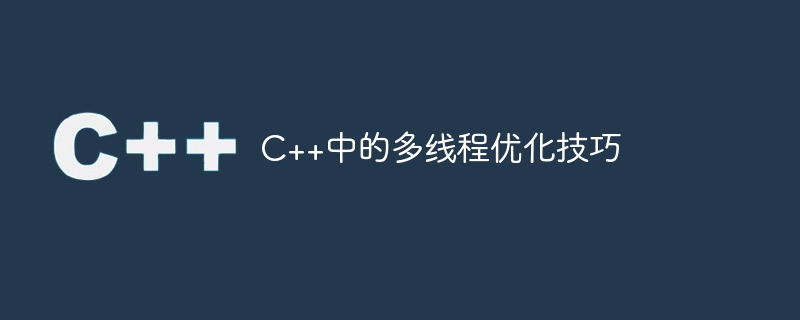Home >Backend Development >C++ >Multithreading optimization techniques in C++
Multithreading optimization techniques in C++
- 王林Original
- 2023-08-22 12:53:121623browse

With the development of computer technology and the improvement of hardware performance, multi-threading technology has become an essential skill for modern programming. C is a classic programming language that also provides many powerful multi-threading technologies. This article will introduce some multi-threading optimization techniques in C to help readers better apply multi-threading technology.
1. Use std::thread
C 11 introduced std::thread, integrating multi-threading technology directly into the standard library. Creating a new thread using std::thread is very simple, just pass a function pointer. For example:
#include <thread>
#include <iostream>
void hello()
{
std::cout << "Hello World!";
}
int main()
{
std::thread t(hello);
t.join();
return 0;
}The above code creates a new thread t, executes the hello function, and waits for thread t to complete. Note that thread creation and destruction requires a certain amount of overhead, so std::thread needs to be used rationally.
2. Use std::async
std::async is another convenient multi-threading technology, which can execute a function asynchronously and return a std::future object. Use std::async to more conveniently manage the execution of asynchronous tasks and obtain results. For example:
#include <future>
#include <iostream>
int add(int a, int b)
{
return a + b;
}
int main()
{
auto async_result = std::async(add, 1, 2);
std::cout << async_result.get();
return 0;
}The above code calls the add function to calculate 1 2 asynchronously, and uses the std::future object to manage the acquisition of the calculation results. It should be noted that std::async uses the std::launch::async strategy by default and will execute functions in a new thread. If you wish to use the std::launch::deferred strategy, you need to specify it manually. However, using the std::launch::deferred strategy will cause the function to be executed only when std::future::get() is called, so the choice needs to be made on a case-by-case basis.
3. Use std::condition_variable
In multi-threaded programming, communication and synchronization need to be carried out between threads, and std::condition_variable can achieve this purpose very well. Using std::condition_variable allows one thread to wait for a certain condition of another thread to be true, thereby achieving synchronization between threads. For example:
#include <condition_variable>
#include <mutex>
#include <thread>
#include <iostream>
std::mutex mutex;
std::condition_variable cv;
bool ready = false;
void producer()
{
std::unique_lock<std::mutex> lock(mutex);
// wait for the condition to become true
cv.wait(lock, [] { return ready; });
std::cout << "Producer done." << std::endl;
}
void consumer()
{
std::this_thread::sleep_for(std::chrono::seconds(1));
ready = true;
std::cout << "Consumer done." << std::endl;
cv.notify_one();
}
int main()
{
std::thread t1(producer);
std::thread t2(consumer);
t1.join();
t2.join();
return 0;
}The above code creates two threads t1 and t2, where t1 is waiting until a condition variable ready becomes true, and t2 sets the condition variable to after waiting for 1 second. true, and notify t1. It should be noted that std::condition_variable must be used in conjunction with std::mutex to prevent multiple threads from accessing condition variables at the same time.
4. Use the thread pool
In the case of a large number of short-term tasks that need to be created and run, the thread pool is often used to improve the performance of the program. The thread pool maintains a certain number of threads and manages the allocation and execution of tasks. Using a thread pool can avoid the additional overhead of frequently creating and destroying threads, while taking full advantage of multi-core CPUs. For example:
#include <iostream>
#include <thread>
#include <mutex>
#include <condition_variable>
#include <vector>
#include <queue>
#include <functional>
class ThreadPool
{
public:
ThreadPool(std::size_t numThreads = std::thread::hardware_concurrency())
{
for (std::size_t i = 0; i < numThreads; ++i)
{
pool.emplace_back([this] {
while (!stop)
{
std::function<void()> task;
{
std::unique_lock<std::mutex> lock{ mutex };
condition.wait(lock, [this] { return stop || !tasks.empty(); });
if (stop && tasks.empty()) return;
task = std::move(tasks.front());
tasks.pop();
}
task();
}
});
}
}
~ThreadPool()
{
{
std::unique_lock<std::mutex> lock{ mutex };
stop = true;
}
condition.notify_all();
for (auto& worker : pool)
{
worker.join();
}
}
template <typename F, typename... Args>
auto enqueue(F&& f, Args&&... args)
-> std::future<typename std::result_of<F(Args...)>::type>
{
using return_type = typename std::result_of<F(Args...)>::type;
auto task = std::make_shared<std::packaged_task<return_type()>>(
std::bind(std::forward<F>(f), std::forward<Args>(args)...));
std::future<return_type> future = task->get_future();
{
std::unique_lock<std::mutex> lock{ mutex };
if (stop) throw std::runtime_error("enqueue on stopped ThreadPool");
tasks.emplace([task](){ (*task)(); });
}
condition.notify_one();
return future;
}
private:
std::vector<std::thread> pool;
std::queue<std::function<void()>> tasks;
std::mutex mutex;
std::condition_variable condition;
bool stop = false;
};
void hello()
{
std::cout << "Hello World!" << std::endl;
}
int add(int a, int b)
{
return a + b;
}
int main()
{
{
ThreadPool pool;
auto f1 = pool.enqueue(hello);
auto f2 = pool.enqueue(add, 1, 2);
std::cout << f2.get() << std::endl;
}
return 0;
}The above code defines a ThreadPool class, which contains multiple threads and a task queue. The thread pool continues to take tasks from the task queue and execute them until the queue is empty or the thread pool stops. Use the ThreadPool::enqueue method to add the task to the task queue and return a std::future object to manage the results of task execution.
In general, C provides a variety of multi-threading technologies to help developers take advantage of the performance of multi-core CPUs and manage threads and tasks more flexibly. Developers should use these techniques appropriately to optimize program performance.
The above is the detailed content of Multithreading optimization techniques in C++. For more information, please follow other related articles on the PHP Chinese website!

